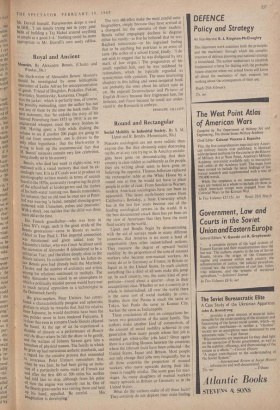Royal and Ancient
THE blurb-writer of Alexandre Benois' Memoirs should be investigated by some bibliophilic equivalent of Leslie Adrian for misrepresentation of goods, 'Friend of Diaghilev, Prokofiev, Fokine, Stravinsky, Stanislaysky, Karsavina, Chagall . . says the jacket : which is perfectly true, of course, but possibly misleading, since the author has not met any of them by the time the book ends. The next statement, that 'he unfolds the story of his beloved Petersburg from 1873 to 1919,' is an un- adulterated whopper, since the story finishes in 1890. Having spent a little while shaking the volume to see if another 200 pages are going to fall out from somewhere, one is driven to the Only other hypothesis : that the blurb-writer is trying to hush up the uncommercial fact that M. Benois' memoirs contain very few celebrities, being chiefly set in his nursery.
Benois, who died last week at eighty-nine, was endowed with a visual memory that must be ex- ceedingly rare. It is as if Casals were to produce an autobiography written mainly in terms of sounds heard in the 1870s, accurately recapturing the pitch of the school-bell at kindergarten and the timbre of his bath-water running out. Benois remembers, for instance, that an old man he once saw at Peter- hof was wearing 'a faded, mended dressing-gown Patterned with Chinamen, palms and peacocks.' With a shock, one realises that the child was three years old at the time.
His French grandfather—who was born in Louis XV's reign, such is the giant stride of the Benois generations—came to Russia as maitre d'hotel to Tsar Paul I. This imperial connection Was maintained and given added tone by Alexandre's father, who was Court Architect until the accession of Alexander II (considered to be a utilitarian Tsar, and therefore deeply alien to the Benois nature). In conjunction with his father-in- law Benois pere had already built the Mariinsky Theatre, and the number of architects and artists baby his relations continued to multiply. The 'abY Alexandre was raised in an atmosphere in which a politically minded person would have met as much natural opposition as a technologist in the Dolmetsch family. His great-nephew, Peter Ustinov, has contri- bpuretedcea characteristically pungent and aphoristic fa in which he remarks that, had his relative been Japanese, he would doubtless have been the n, ne painter never to have rendered Fujiyama. It Is clear that even in rompers Uncle Shoura abjured the banal. At the age of six he experienced a shudder of distaste at a performance of Beauty and the Beast where he felt the decor to be gaudy, andL h e waltzes of Johann Strauss gave him a sensation of physical nausea. The family in which he grew up had meticulous aesthetic standards, and a regard for the creative process that amounted to reverence. Peter Ustinov remembers that, when he was four, he had been giving an imita- tion L a particularly noisy make of French car and after the first 400 or 500 miles his mother had told him to stop, although from his point ?,f view the engine was scarcely run in. One of the Benois great-uncles was visiting them and held up his hand, appalled. 'Be careful. . . . His pagination is developing.' The very old often make the most candid auto- biographers, simply because they have arrived at a disregard for the opinions of their readers. Benois rather engagingly declines to disguise either his vanity—at five he believed that he was Raphael reincarnate—or his ingrained feeling that to be anything but patrician is an error of taste. (He writes of a school friend, kindly : 'I do not wish to suggest that he was disfigured by any
mark of low origin.') The progressives of his youth repelled him, and he was saddened by rationalism, which he typically regarded as synonymous with cynicism. The most interesting chapters in this lulling and sweet-tempered book are probably the ones about his infant taste in art. He enjoyed Struwwelpeter and Pictures of English History because they frightened him, for instance, and Faust because he could not under- stand it : the Romantic in embryo.
PENELOPE GILLIATT






































 Previous page
Previous page